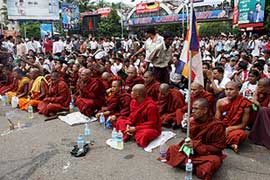
|
|
|
Home Asia Pacific South East Asia Myanmar Myanmar Protest News A small flame of hope burns in Burmaby Joel Brinkley, San Francisco Chronicle, October 7, 2007San Francisco, USA -- A small community of exiles and devotees keeps the flame alive for Myanmar, née Burma. Since the nation achieved independence in 1948, military dictators have ruled, even terrorized, the population and snuffed out each protest or initiative intended to open the society.
Tens of thousands of other Burmese joined them in the nation's largest demonstration of modern times. The world cheered as the military, at first, showed restraint. It seemed impolitic for anyone to stand on the side of the government, so it had no public defenders.
Once again the advocates had hope; some were giddy as the world focused on their country, so often ignored. "Thank you for keeping the public's attention on Burma," said Ingrid Jordt Applbaum, a former Buddhist nun in Burma and now a professor of anthropology at the University of Wisconsin, when I asked to speak to her. But then about a week ago, the army took to the streets, killing some monks, arresting others and locking the rest in their monasteries. Now, troops patrol the streets; military helicopters watch from the sky. The demonstrations have come to an end. "We have done enough," the New York Times quoted one Burmese demonstrator as saying late last week. "We can no longer move around. We cannot do anything any more. We are hunted by soldiers. We are down." So now the uprising appears to be dead, just like previous failed efforts in 1988, when the military killed 3,000 protesters, and 1990. Burma seems to be one of those problems that the world is powerless to correct - like President Robert Mugabe's destruction of Zimbabwe, or the government-sanctioned cultivation of coca in Bolivia. I spoke to a few Burmese experts. There aren't many. As an area of study, the situation is so unsatisfying and unchanging that it doesn't attract legions of concerted activists. Maureen Aung-Thwin, a Burmese American, at first seemed resigned. "It may take another 10 years - but if it does, I might kill myself!" she said, half joking. She is director of the Burma project at the Open Society, whose goal is to "help the country make the transition from a closed to an open society." But after a moment of reflection, she insisted, "I don't think it is finished. Burma is much more connected with the world now. The military relies on the same technology. They can't cut it off. I don't think this is over." But then mid-week, the junta shut down the nation's two Internet service providers. Jordt Applbaum, the former Burmese nun, insisted, "I think something has changed. This regime is playing its last, desperate card." Like the others, her assessment sounded more like an expression of hope than conviction. David Steinberg, an Asian studies professor at Georgetown University and a leading Burma expert, is in Singapore right now, on his way to Burma in a few days. "I don't think this is just another failed rebellion," he averred. "Rebellions have a cumulative effect And I think there are some in the military who are probably appalled by what has happened." Perhaps, he suggested, an uprising from within the military could bring the junta down. Burmese history offers no precedent for this, he acknowledged, "but we are beyond precedent here." As if on cue, the next day a Burmese army major fled to Thailand and told a Thai TV reporter: "As a Buddhist myself, when I heard that monks had been shot dead on the streets and that other people had been shot dead, I felt very upset." All the experts insisted that one change may yet bring the regime's downfall - its attack on the monks. Buddhism is to Burma as Islam is to Saudi Arabia. The state revolves around the faith. Every government, including this one, works assiduously to cultivate the religious authorities. They build great pagodas and constantly promote their fealty to the faith. "Now they have just destroyed that," Steinberg observed. We have been conditioned to expect results overnight, brought to us on television - as happened in the Soviet Union, Poland, Georgia, Ukraine. Perhaps this time, though, we should listen to the experts who have stuck with Burma, even after many others turned away. The demonstrations may be over. But their repercussions may very well bring change - in time. ------------------- |
 Get your Korean Buddhist News here, brought to you by BTN-Buddhist Channel |
 |
 The Mandala app brings together Buddhist wisdom and meditation techniques with the latest insights of psychology and neuroscience to handle the challenges and complexities of modern life. The App offers a series of engaging talks and conversations with experts on a wide variety of topics, such as managing stress, dealing with adversity, developing greater resilience, cultivating empathy and compassion, creating healthy relationships, and many more. These topics are explored to help find greater peace, meaning and joy in our lives. Our panel of experts include Dr, Thupten Jinpa, Daniel Goleman, Kelly McGonigal and others.FREE DOWNLOAD here |
| Point
your feed reader to this location |
| Submit an Article |
| Write to the Editor |

 The plight of the nation's 47 million people has remained so desperate for so long, the situation inside the country so static and intractable, that many advocates have grown weary. Some have dropped away. Then, last month, Burma's Buddhist monks tried to stand up to the ruling military junta, en masse.
The plight of the nation's 47 million people has remained so desperate for so long, the situation inside the country so static and intractable, that many advocates have grown weary. Some have dropped away. Then, last month, Burma's Buddhist monks tried to stand up to the ruling military junta, en masse. 